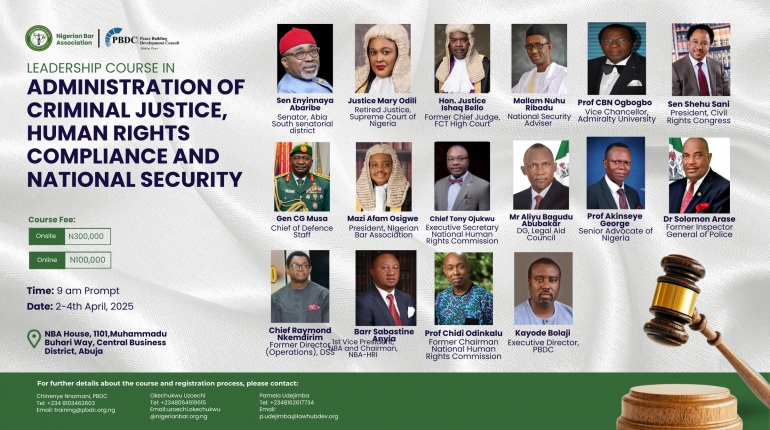
LEADERSHIP COURSE IN ADMINISTRATION OF CRIMINAL JUSTICE, HUMAN RIGHTS COMPLIANCE AND NATIONAL SECURITY
THEME: National Security: the role of an efficient justice system and compliance with human rights principles in addressing insecurity in Nigeria.
BACKGROUND
The combined work of security agencies in the fight against insecurity in Nigeria is grounded in an efficient and transparent criminal justice process that respects the principles of the rule of law and human rights. They can offer a peaceful, accountable, and legitimate response to terrorism. This kind of criminal justice response to insecurity can help avoid or mitigate the risk of unreasonable and/or unlawful use of force outside the protection and procedural guarantees offered by the due process of law.
The criminal justice systems’ role in the fight against insecurity is challenging. Indeed, the primary objective of security strategies must be to prevent crime and terrorism from taking place. A forward-looking, preventive, well-funded criminal justice strategy against violence and crime requires a comprehensive system of substantive offences, investigative powers and techniques, evidentiary rules, and international cooperation. The goal is to proactively integrate substantive and procedural mechanisms to reduce the incidence and severity of insecurity and to do so within the strict constraints and protections of the criminal justice system and the rule of law.
Sometimes, prosecution of crimes in Nigeria exposes the challenges in the criminal justice system and the lack of inter-agency collaboration in dealing with security challenges, i.e. Military Officers apprehend criminals only to see their efforts undermined by an ineffective Criminal Justice System, which allows criminals to be released for lack of evidence leading to further insecurity and retaliation. These issues weaken public trust and the integrity of the criminal justice system. Also, a recurring issue is the breakdown of trust and collaboration between the Military, Police, and other Security Stakeholders, which compromises justice and undermines the fight against insecurity.
This course aims to address these systemic gaps in the criminal justice system, foster dialogue among stakeholders, and propose actionable strategies to enhance inter-agency collaboration, build capacity, and strengthen Nigeria's national security framework.
Rationale
Reports of widespread collusion between security agencies and non-state actors have been a growing trend. It was reported in Zamfara that the conferment of a chieftaincy title on a notorious bandit and alleged mass murderer confirms elite collusion and wrong response to the fight against insecurity by the Nigerian state. The inability or failure of security agencies to leverage technology in combating terrorism poses a significant setback in the fight against terrorism. These lapses have led to a breakdown of law and order with security agencies resorting to extra-judicial killings, which threaten the foundation of democratic ideals and pose a threat to the criminal justice sector.
To address these challenges, the Judiciary has a key role. The Interpretation of Laws in line with human rights principles and standards is key. Besides, Protecting the rights of accused persons, including the right to a fair trial, freedom from torture, and right to liberty should be guaranteed, and establishing accountability mechanisms to investigate and address human rights abuses by law enforcement and other state actors and conducting judicial review of executive actions to ensure compliance with human rights standards. Sentencing and Rehabilitation policies should be prioritized, and restorative justice, rehabilitation, and reintegration of offenders be well embedded within the pronouncement of the courts.


